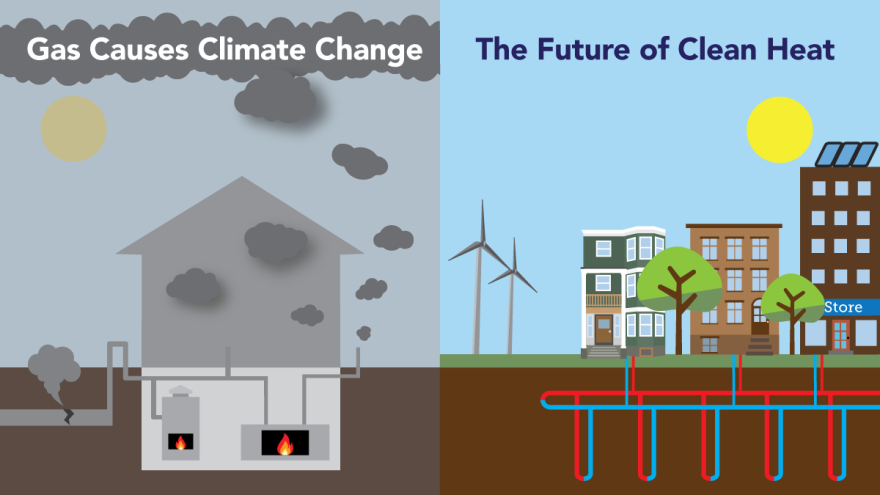Buildings make up more than a quarter of greenhouse gas emissions in Massachusetts.
Now, a first-of-its-kind commission has been tasked with coming up with ways to reduce building emissions, and has until November to present policy ideas.
CAI's Kathryn Eident talked Dorothy Savarese, CEO of Cape Cod 5, and a member of the Massachusetts Commission on Clean Heat, about what she hopes the group can accomplish.
Eident This commission has 22 members from a range of backgrounds, including finance, like you, real estate, urban planning, housing, and technology. What kind of perspective do you bring as head of a community bank that is very visible here on the Cape?
Savarese You know, I wear a couple of hats, first of all, I get to represent, you know, Cape Cod and its considerations, although there actually is another person from down here who's on it, who's a heat pump expert. And, I also get to represent a community bank that actually piloted a solar energy loan, but also does a lot of heat loans, which are energy efficiency loans. And so, we have a real focus on environmental sustainability. And I don't know if they knew it when they appointed me, but I am on the Executive Committee of the Cape Cod Climate Change Collaborative. And, so one of the things that I'm careful about doing when I participate is identifying the perspective that I'm speaking from so that it's clear, you know, where that's coming from.
Eident This is a first-of-its-kind in the nation commission. What makes it different from something like Mass Save, which encourages residents to make their homes more weather tight in an effort to save energy?
Savarese Well, Mass Save is certainly one of the tools, right? But when you look at what the goals are in terms of emissions — so right now, the built environment comprises 27% of the greenhouse gas emissions in the Commonwealth. And so by 2030, overall greenhouse gas emissions, the limit that's been set is 50 percent diminution. And then, of course, net zero by 2050.
So, weatherization is a very important part of it. But what are some of the other things that are going to reduce onsite emissions from heating sources for homes? And so, one of the things that the governor did was he also established a technical committee. And, that task force is helping to support the work and the deliberations of the commission. There will be an opportunity for public input so that a variety of solutions and alternatives can come into play.
Eident I was going to ask if the public could weigh in because it's a fairly tight deadline for such a large group of people to come up with something concrete.
Savarese It is. Our remit is quite narrow. There are other parts of the Commonwealth and of the executive branch that are working on things like transportation and other elements there. But again, there's been such great foundational work.
But at the end of the day, to your point, coming to consensus when there are diverse points of view takes work and that's what the commission is working on.
Eident Is there a mandate to also try to find ways to pay for ideas or policies the group comes up with?
Savarese Our job is policy recommendations. The administration has already committed publicly to the utilization of ARPA funds and things like that, and it has a variety of sources of funds at the federal and state level that are already in play. But there will be specifics relative to implementation and supporting funding that will come along with that. And, all of the appropriate stakeholders will have to play a part in crafting the funding outcomes.
Eident Is there any worry the commission's work will go unused given the fact that we have a gubernatorial election coming up in November and Gov. Charlie Baker is not running for reelection?
Savarese That is a great point. And, any time there's a change in administrations, of course there will be transition challenges. One would hope that whoever the next governor and lieutenant governor are will build on the great foundation that's been done already.
So ideally, I think for the Commonwealth of Massachusetts, the criticality of doing something about climate is so important. Look at the warming seas that are surrounding us now and the ocean acidification that's coming on, the implications for ground stocks. A lot of our industries are being impacted by this. So, I think that in our Commonwealth, getting a sense of how important this is, is part of the work.
Eident Finally, what do you want residents to know as we think about how buildings are heated and cooled within the context of climate change?
Savarese It can make a meaningful difference in terms of the solution. Also, there is a focus on making sure that this is being done equitably. If we can reduce emissions, we actually are going to improve public health in a much shorter period of time even than the implications for climate.
The resilience of our systems will ultimately be strengthened by this. And an analysis was done that showed that the cost of doing nothing and the cost of completely transforming this are equal. So, if in 2050 for your children, you want to think about a Commonwealth that is actually creating a healthier, safer environment for them and the total cost to the Commonwealth is the same. I think that's a pretty compelling argument to make.
Eident That's Dorothy Savarese, CEO and Chairperson of Cape Cod Five Cents Savings Bank and a member of the state's new Commission on Clean Heat. Dorothy, thanks so much.
Savarese Thank you, Kathryn.
This transcript was lightly edited for grammar and clarity.








